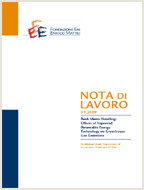Adaptive Policy Mechanisms for Transboundary Air Pollution Regulation: Reasons and Recommendations

15.05.2012
J. Andrew Kelly, Herman R.J. Vollebergh
Q52, Q53, Q58
Transboundary Air Pollution, Emission Ceilings, Flexibility, Adaptive Policy, Integrated Assessment Modelling
Climate Change and Sustainable Development
null
In the context of transboundary air pollution policy the broad ambition is to achieve reductions in the level of environmental and societal damage associated with certain pollutant concentrations and exposure rates in a cost effective manner. Policy formulation and legislative frameworks in this field, such as the current National Emissions Ceiling Directive in the European Union, are challenged by the degree of scientific complexity involved, the dispersed sources of emissions, and the inherent uncertainties associated with long range forecasting under these conditions. This paper identifies the reasons why varied forms of adaptive policy mechanisms (also termed flexibilities) are necessary and valuable in this arena, presents the critical considerations for their design and operation, reviews a selection of the more prominent options currently considered in the associated transboundary research community, and concludes with recommendations for the next set of transboundary air pollution policy frameworks.
